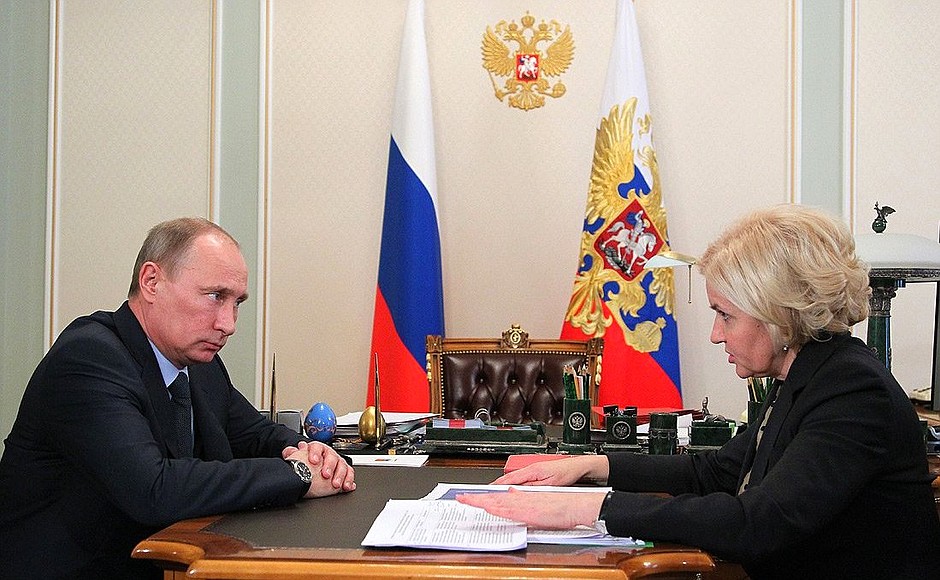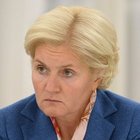
See also
Ms Golodets, who oversees social issues in the Government Cabinet, briefed the President on measures to simplify procedures for adoption of orphaned children by Russian citizens and to improve the standard of healthcare for children with disabilities.
* * *
President of Russia Vladimir Putin: Ms Golodets, the foreign adoption issue is the subject of much debate at the moment. While important, this isn’t the biggest issue. Much more important is what is happening with orphaned children and children without parental support, what is happening with their care and education. What I mean here is that foreign adoptions concern a few hundred children, but to our huge regret, the number of orphaned children and children without parental care comes to thousands in Russia.
I want to discuss with you today what the Government is doing to implement the Presidential Executive Order of December 2012. Go ahead, please.
Deputy Prime Minister Olga Golodets: Mr President, this is indeed one of the biggest problems facing our society today. There are 128,000 children in this situation in Russia today, children who need foster families. Last year, 69,000 children were placed with new families. This year, acting on the Executive Order you signed on December 28, we drafted a package of documents – the Government has already examined them – that propose a number of new measures and essentially set a new policy with regard to adoptions.
Our goal is to lower the number of orphans in state care. We have set the target of bringing the number down by 30,000 over the coming year. We will do this through the following measures.
Vladimir Putin: You want to reduce the number by 30,000?
Olga Golodets: Reduce the figure by 30,000 from what it is now. We are putting in place the conditions that will make it possible for some categories of people previously prevented by particularities in the law from taking orphaned children into their families to now do so. This concerns above all older brothers and sisters of orphaned children. This was an old problem that has been discussed for a long time now. Our draft law does not set a required age gap between the adopter and adoptee. This will be something for the courts to decide.
Secondly, the draft law also addresses the issue of a whole number of illnesses that previously prevented potential adoptions, and in particular was often a big obstacle for adoptions by grandparents. But today, first- and second-stage cancers, say, after treatment, are not the obstacles they would have been in the past for adopting a child.
The bureaucratic procedures have changed substantially. The formalities have been simplified a lot. There are now fewer formalities to complete, and the time it takes to complete the adoption process will be a lot shorter too.
Material support for families that decide to take in a foster or adopted child is also an important aspect. Benefits for children with disabilities have been increased by 20 percent and will now come to 8,700 rubles a month. The one-off payment for parents who adopt children with disabilities, children with several brothers and sisters, or children aged seven and over has also been increased because these are the groups for whom it is hardest to find new families today.
It is an important thing that all the debate over orphaned children really has drawn guardians’ and the public’s attention to the issue, and we hope that this will help us to speed up the work to carry out repeat medical examinations for all orphaned children, above all those in children’s homes.
We have drawn up a programme for these medical examinations. All orphans currently in state care will be examined by July 1. Their diagnoses will be clarified and we will guarantee that they all receive advanced treatment and all necessary medical aid, as well as the psychological support they need.
But you are absolutely right to note that there are problems in our society in general, not just with orphans. We have 576,000 children with disabilities in Russia today. In drawing up the programme we decided that we should revise the whole range of healthcare measures currently in place. The healthcare provision standards do indeed currently exclude absolutely self-evident things that we need to do.
Vladimir Putin: There are no grounds for these exclusions.
Olga Golodets: That is indeed the case. We are talking about exclusions such as cochlear implants and the speech devices needed to maintain them in proper working order, particular chemotherapy procedures, and endoprosthesis replacements. The relevant provisions have been drafted now and these things will be included in compulsory medical insurance programmes.
We believe that Russia can provide its children with the full range of high-tech medical treatment, and we will do this as a matter of course.
Vladimir Putin: We know that children with particular illnesses in institutions are in an especially difficult situation. Do you have plans for these children?
Olga Golodets: Yes, we do have plans in this area. There are 14,164 children in this case, children with disabilities. A programme has been developed for each of these children now and each of them will receive help. But as I said, many guardians say that the diagnoses are not entirely correct. For example, children are often diagnosed as mentally retarded when this is not in fact the case. We therefore will get civil society to help us here in order to make progress on this matter.
Vladimir Putin: I see. So, if I’ve understood you correctly, the children will first undergo a more thorough medical examination and then you will decide on the measures needed for their support and treatment.
Olga Golodets: Yes, that is the plan for the children that we know already are in need of help. We will provide the needed help and carry out a more thorough medical examination.
Vladimir Putin: Good.
<…>
